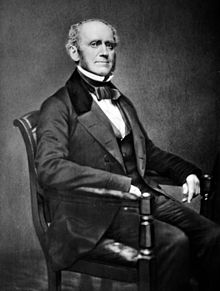Fitz-Greene Halleck
| Fitz-Greene Halleck | |
|---|---|

Fitz-Green Halleck
|
|
| Born |
July 8, 1790 Guilford, Connecticut, U.S. |
| Died | November 19, 1867 (aged 77) Guilford, Connecticut, U.S. |
| Occupation | Poet |
| Nationality | American |
Fitz-Greene Halleck (July 8, 1790 – November 19, 1867) was an American poet notable for his satires and as one of the Knickerbocker Group. Born and reared in Guilford, Connecticut, he went to New York City at the age of 20, and lived and worked there for nearly four decades. He was sometimes called "the American Byron". His poetry was popular and widely read but later fell out of favor. It has been studied since the late twentieth century for its homosexual themes and insights into nineteenth-century society.
In 1832, Halleck, a cultural celebrity, started working as personal secretary and adviser to the philanthropist John Jacob Astor, who appointed him as one of the original trustees of the Astor Library. Given an annuity by Astor's estate, in 1849 Halleck retired to Guilford, where he lived with his sister Marie Halleck for the remainder of his life.
Fitz-Greene Halleck was born on July 8, 1790, in Guilford, Connecticut, in a house at the corner of Whitfield and Water Streets. He had an older sister Marie, and his father owned a store in the town. At the age of two, the young Halleck suffered a hearing loss when two soldiers fired off their guns next to his left ear; he was partially deaf for the remainder of his life. He left school at 15 to work in his family's shop in Guilford.
In May 1811, the 20-year-old Halleck moved to New York City to find work. After a month of searching, he had all but given up and made plans to move to Richmond, Virginia, but he was hired by a banker named Jacob Barker. He worked for Barker for the next 20 years.
Halleck began to write with his friend Joseph Rodman Drake. In 1819 they wrote and published the anonymous Croaker Papers, which were satires of New York society. These 35 poems were published individually in The Evening Standard and National Advertiser over several months. An unauthorized collection was published in 1819 with 24 selections. They published the poems under the pseudonyms Croaker; Croaker, Jr.; and Croaker and Co., taken from a character in Oliver Goldsmith's The Good‐Natured Man. The "Croakers" were perhaps the first popular literary satire of New York, and New York society was thrilled to be the subject of erudite derision.
...
Wikipedia
